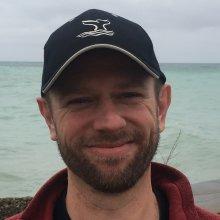
Clinton Marcus
Tell us about your work/research. What kinds of things do you do?
As a Physical Scientist at NOAA's Atlantic Hydrographic Branch, I work to ensure that data submitted by our field units and contractors meet the standards set by NOAA and the International Hydrographic Office (IHO). This ensures that the data making it to our nautical charts is as accurate as possible for the safety of navigation. I also spend time out on our hydrographic ships for one to two months a year collecting data and training junior personnel.
What sparked your initial interest in your career?
I have always been fascinated with the ocean, from an early age. Growing up watching Jacques Cousteau, and reading Clive Cussler novels, deepened that fascination. Working for NOAA was always a dream job and I'm lucky to have had the opportunity.
Who influenced you or encouraged you the most?
My family has always encouraged me to pursue my dreams and have stood beside me all along the way.
What element of your work/study do you think is the most fascinating?
I think never knowing what you might find on the seafloor has to be the best part of working in hydrography. Maybe you'll find a wreck, maybe a new geologic formation...who knows!
What other jobs led you to your current career?
Prior to working for NOAA, I was a Sonar Technician on submarines in the Navy for nine years. I started working for NOAA during the summer while I was in college and sailed on multiple ships before landing on the NOAA Ship Fairweather, where I worked as a Hydrographic Senior Survey Technician for 5 years.
What are your degrees and certifications?
Bachelor of Science in Marine Science -- Maine Maritime Academy 2010
What are your hobbies?
I enjoy getting out on the golf course, getting away to the mountains be it for camping, hiking or just relaxing. I also enjoy SCUBA, cooking and I am an avid reader.
How did you get involved with the TBNMS project with OET?
I was lucky in that there was an opening, and I was asked to represent the Office of Coast Survey for this project.
What advice would you give someone who wants to have a career like yours?
If you would like to pursue a career in hydgrography, the biggest skills you should have in your tool bag are a passion for being on the water, the ability to adapt to ever-changing situations and the quest to never stop learning. The rate at which technology is changing has had an enormous impact on hydrography, with an emphasis on automation. The rise of Autonomous Survey Vessles (ASVs), and automation in processing and quality control have made a far-reaching impact on the nature of survey work.
